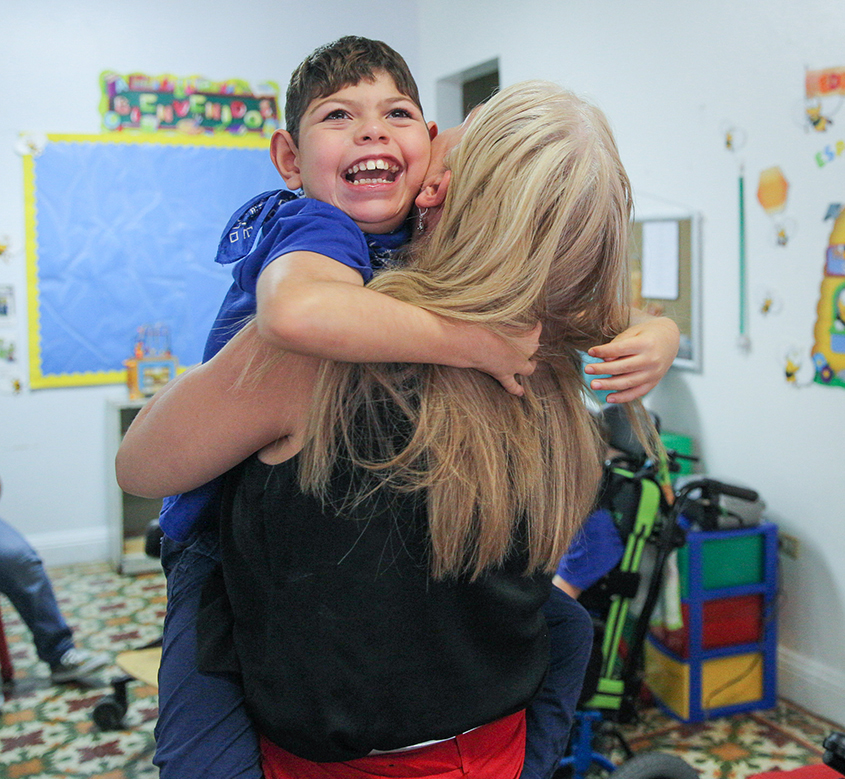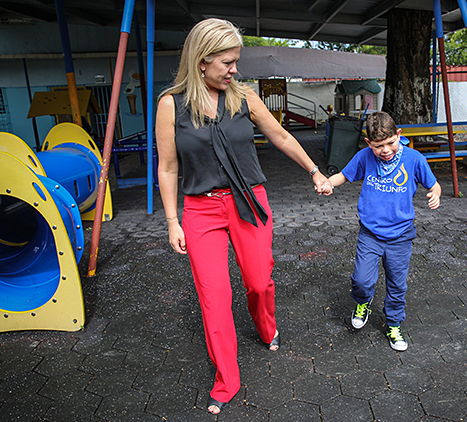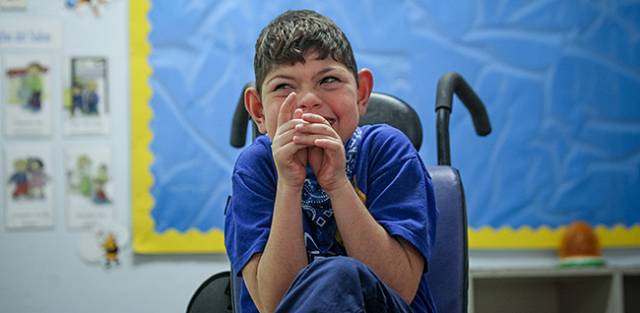You are here
Raising Felix
Coralaideé Jiménez, a single mom living in San Juan, Puerto Rico, changes diapers, prepares bottles, and dresses her son, Felix, for school every day. And all night, she holds him.
Felix is 11.
He was born with microcephaly, a condition where a baby’s head is much smaller than expected. As a result of research done during the recent Zika outbreak, a link between Zika virus infection during pregnancy and microcephaly and other severe brain defects has been found.
Although Felix’s condition was not caused by Zika, as microcephaly has many other causes, Coralaideé understands what it’s like to raise a child with microcephaly. As an advocate for children with special needs, she says she’s been put in the right place at the right time as Zika is spreading across the island of Puerto Rico.
To date, more than 30,000 cases of Zika virus infection have been reported in Puerto Rico, and Zika has infected more than 2,200 pregnant women in U.S. territories, including Puerto Rico. Just weeks ago, Puerto Rico announced its first baby born with Zika virus infection and microcephaly.
 Coralaideé realized that her son had microcephaly when he was born. “It’s not easy,” she said. “I love my life with my son. I would not change a thing, but it’s hard.”
Coralaideé realized that her son had microcephaly when he was born. “It’s not easy,” she said. “I love my life with my son. I would not change a thing, but it’s hard.”
Felix has seizures almost daily and challenges with his vision and hearing. “He needs the same things as any other child, but I have to work much harder,” said Coralaideé. “I have to work three times harder to get what he needs, including education and medical services.”
Understanding Felix is a challenge. He has trouble communicating. “When he’s crying, when he’s hungry or when he’s in pain, I don’t know what’s going on,” she said. “He’s an 11 year old, and he does not talk. He’s not verbal at all.”
Knowing firsthand what it is like to have a child with microcephaly, Coralaideé is working in partnership with Judith Torres-Kilgore, M.P.H., an emergency preparedness analyst with the Puerto Rico Department of Health, to share the message of Zika prevention throughout the island. Judith is working with universities, Women, Infants and Children clinics, childcare programs, and nonprofit and faith-based organizations to provide training and get Zika prevention information to as many people as possible. “My passion is working in the community,” said Judith. “We provide our partners with the information and resources, and they continue the work.” As a representative of families and children with special needs, Coralaideé talks about the emotional, social and economic effect of having a child with microcephaly. She wants to put a face to microcephaly, and share her personal struggles with those who are being trained to prevent Zika and care for children with disabilities. “When they hear my story, look at pictures, they understand a little better the challenges,” she said. “They see it firsthand, and some of them realize that this is real and has long-term effects on every aspect of a child’s life and their family.”
As a representative of families and children with special needs, Coralaideé talks about the emotional, social and economic effect of having a child with microcephaly. She wants to put a face to microcephaly, and share her personal struggles with those who are being trained to prevent Zika and care for children with disabilities. “When they hear my story, look at pictures, they understand a little better the challenges,” she said. “They see it firsthand, and some of them realize that this is real and has long-term effects on every aspect of a child’s life and their family.”
Services for special needs children lack necessary resources, even in the continental United States. “Puerto Rico presents even more challenges,” said Ruth Perou, Ph.D., National Center on Birth Defects and Developmental Disabilities, Centers for Disease Control and Prevention (CDC).
Given the spread of Zika, health officials in Puerto Rico are expecting more babies to be born with microcephaly in the future. Coralaideé often gives advice to mothers who may have children with special needs. “It changes your life. It’s going to be tough. You will cry a lot. Your child will need you the rest of your life,” she said. Coralaideé wants to offer support to women who have children with special needs through sharing her story and advocating. But more than anything, she wants to protect as many babies as possible. At each of the training sessions, Coralaideé and Judith emphasize the importance of Zika prevention, especially for pregnant women. They provide information about removing standing water in yards, wearing long-sleeved shirts and pants and EPA-registered insect repellent to prevent mosquito bites, and using condoms to prevent sexual transmission of Zika. “You are protecting your child. You are protecting what you love most in your life,” Coralaideé says.
Coralaideé wants to offer support to women who have children with special needs through sharing her story and advocating. But more than anything, she wants to protect as many babies as possible. At each of the training sessions, Coralaideé and Judith emphasize the importance of Zika prevention, especially for pregnant women. They provide information about removing standing water in yards, wearing long-sleeved shirts and pants and EPA-registered insect repellent to prevent mosquito bites, and using condoms to prevent sexual transmission of Zika. “You are protecting your child. You are protecting what you love most in your life,” Coralaideé says.
The CDC Foundation is striving to help CDC meet urgent needs that require philanthropic and private sector support. For more information about how you can help with Zika prevention and response, visit www.cdcfoundation.org/zika-response. Visit CDC for more information on microcephaly.
Photos: © Evelyn Hockstein / CDC Foundation

